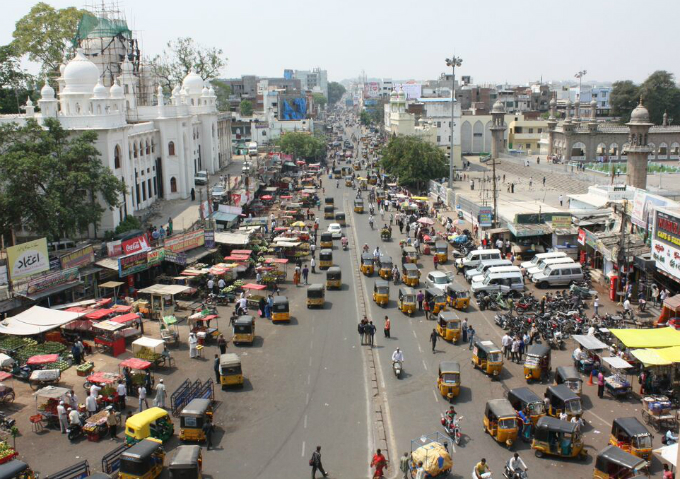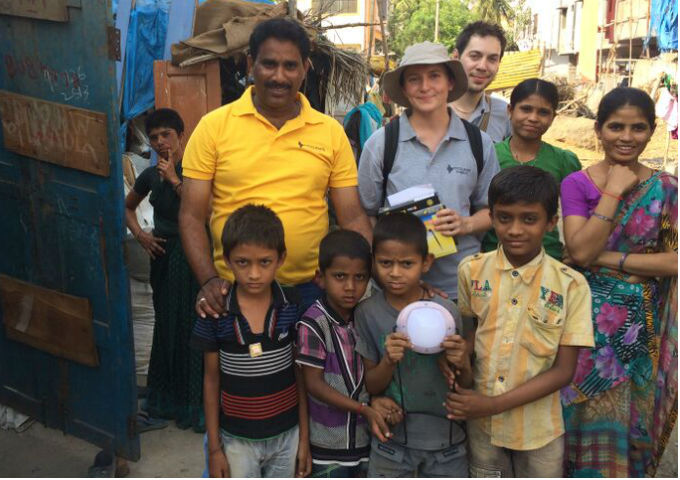-
Member Login
- Home
- About
- Institute Groups
- Membership
- Events
- News & Publications
- Institute Programs
- Resources
- Jobs Board
- Contact Us
- Site Info
Pollinate in Hyderabad

Zara Marais from the EIANZ Victorian Division Committee reflects on her time working with Pollinate Energy in Hyderabad, India.
In April this year I travelled with two AECOM colleagues to Hyderabad, India to participate in Pollinate Energy's Young Professionals Program (YPP).
Pollinate Energy is an organisation passionate about creating sustainable solutions to social problems - and in Hyderabad they're focusing on improving the lives of the city's urban poor by providing them with access to affordable renewable energy products, including solar lights.
Pollinate Energy’s expansion into Hyderabad is its first operation outside of Bangalore, where the organisation started in 2012. The goal of the Hyderabad office is to prove the scalability of the Pollinate Energy business model - a critical step in their larger expansion plan. Success in Hyderabad will hopefully pave the way for achievement of their ambitious target of addressing energy poverty across 50 Indian cities by 2020.
The two members of the Pollinate Energy team responsible for building the business in Hyderabad - known as the ‘city co-founders’ - are Paul Sullivan and Pascal Meline. Paul and Pascal will spend a year in Hyderabad training the local operations manager and sales manager, as well as recruiting a team of ‘Pollinators’. The Pollinators are local Indian micro-entrepreneurs who earn a commission selling the various products provided by Pollinate Energy to people living in urban slum communities. The ultimate goal of the city co-founders is to ensure that the business is capable of sustaining itself in the long term.
Our task during the YPP was to help Paul and Pascal work on four key projects. The objective of the project that I worked on was to increase recruitment of female Pollinators. With my team, I focused on identifying barriers to recruitment of women in India and how Pollinate can break these down to ensure they’re providing equal employment opportunities.
As we started to make progress on our projects, the co-founders encouraged us to take on more responsibility around the office. This gave us a taste of the chaos and the rewards of their day-to-day work. On the day that I was to give a presentation to five women who had expressed an interest in becoming Pollinators, we experienced a six-hour power cut. To add to the challenge, we soon discovered that all five of the women only spoke Hindi. All of the presentation material was either in English or Telugu (the local language in the state of Telangana). We ended up running the presentation off of my half-charged laptop in the soaring heat — translating the English messages from the slides and videos into Hindi with the help of Sweta, Pollinate Energy’s human resources manager. We then approached all of the Hindi speakers in the office for help, and interviewed each of the applicants in teams of three.
In addition to these projects, we also spent time training and assisting the new Pollinators. We ran through theory with them in the morning, before travelling out to the communities with them in the evenings to continue training in the field.

Every community was different; sometimes, we received a warm welcome, and at other times we were met by a sceptical crowd. Every sale had to be approached from a different angle once the needs of a particular community were understood. Some communities already had access to electricity, but supply was unreliable and came at a high cost. Meanwhile, other communities had an alternative source of light (such as coconut oil lamps) but were paying daily to charge their mobile phones at local stores. The new Pollinators had to figure out which benefits of the solar product to focus on, and it was our job to prompt them with ideas if they got stuck. A good sales pitch and a dose of persistence were often rewarded, and it was always great to see smiles on the faces of both the customers and the Pollinators each time a sale was made.
Exploring Hyderabad was an incredible experience. It’s a city of contrasts — old and new, loud and serene, rich and poor, beautiful and confronting. The Pollinate Energy office is located in a peaceful neighbourhood, but only a few hundred meters away is a chaotic main street packed with people, traffic and street food vendors. Further into the city, we saw ancient architecture standing beside the vast, modern office buildings. As we started to enter the communities, we met people who live without access to basic services like water and electricity. At the same time, most families within these communities will own a mobile phone, and it was not uncommon to see satellite dishes attached to tents.
If there’s one important lesson that Pollinate Energy can learn from Hyderabad, it’s that every city that they move into will present different challenges and opportunities. Each set of co-founders will have a lot to learn about their city and its people, and what role they can play in addressing key social challenges.
To learn more about Pollinate Energy's ambitious expansion program and how you can get involved, visit their website.
To read more about my own journey with Pollinate Energy and AECOM's ongoing involvement with the YPP, have a look at my posts and those of other YPP participants on the AECOM Impact blog.
We acknowledge and value the rights and interests of Indigenous Peoples in the protection and management of environmental values through their involvement in decisions and processes, and the application of traditional Indigenous knowledge.

